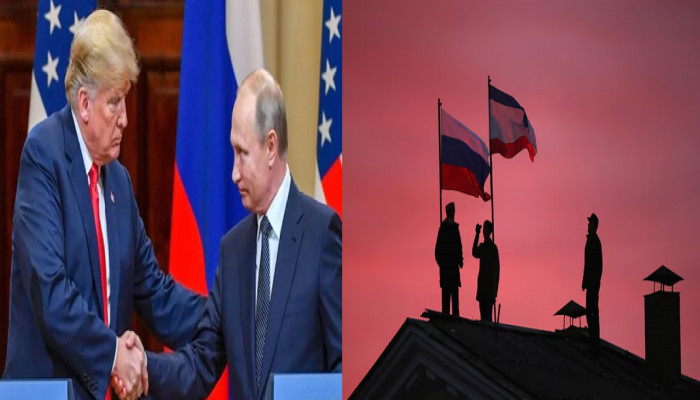US may acknowledge Russia's Crimean annexation in proposed peace agreement
- In Reports
- 11:30 AM, Apr 19, 2025
- Myind Staff
The United States is ready to acknowledge Russia’s control over Crimea as part of a larger peace deal between Moscow and Kyiv, according to sources familiar with the issue. This possible compromise shows President Donald Trump’s strong interest in finalising a ceasefire agreement. It also comes as both Trump and Secretary of State Marco Rubio hinted on Friday that the U.S. may end its efforts to mediate peace if progress isn’t made soon.
In 2014, Russia took control of Crimea through an invasion and a referendum held under occupation, but the international community has refused to recognise the peninsula as part of Russia to avoid legitimising the illegal annexation. Recognising it would go against international laws that forbid taking land by force. Ukrainian President Volodymyr Zelenskiy has made it clear that he will not give up any territory to Moscow. However, this move could benefit Russian President Vladimir Putin, who has long wanted global recognition of Russian control over Crimea. Despite this, Putin has rejected President Trump's proposal for a broad peace deal. Sources say no final decision has been made yet, and the White House and State Department have not commented. A US official familiar with the talks declined to share details.
On Thursday, the US presented proposals in Paris to help broker a peace deal between Russia and Ukraine, which included terms to end the fighting and ease sanctions on Moscow if a lasting ceasefire is achieved. The plan would largely freeze the frontlines, leaving most of the Ukrainian territory occupied by Russia under Moscow's control, and remove Ukraine's NATO membership aspirations from the table. The details of the discussions were kept confidential, but the talks involved French President Emmanuel Macron, US envoy Steve Witkoff, and security advisers from France, Germany, the UK, and Ukraine. The allies plan to meet again next week in London.
Meanwhile, President Trump expressed impatience, stating that while he hoped for progress on a ceasefire, the US was ready to walk away if either side was not committed to the process. “If for some reason, one of the two parties makes it very difficult, we’re just going to say, you’re foolish,” Trump told reporters Friday in the Oval Office. “You’re fools, you’re horrible people, and we’re going to just take a pass. But hopefully we won’t have to do that.”
Trump's proposal needs to be discussed more with both Europe and Ukraine, as Ukraine might not agree with some of the concessions Trump has suggested. He has also stated that Ukraine’s goal of joining NATO is not possible.
According to one official, while the US plans still need to be worked out with Kyiv, they won't offer a final solution, and European allies won’t recognise any territories occupied by Russia as part of Russia. The officials pointed out that talks won’t matter unless Russia agrees to stop the fighting, and providing Ukraine with security guarantees is also crucial to making sure any deal is upheld.
On Friday, Rubio mentioned that security guarantees are a reasonable request from Ukraine, but so far, negotiators haven’t focused on the details. “Every sovereign nation on Earth has a right to defend itself,” he said.
Kyiv has agreed to a ceasefire and insists that Moscow must do the same before any other discussions can take place. In Paris, Ukrainian officials focused on how a ceasefire would be monitored and the possibility of peacekeeping forces. Despite this, Russia has continued bombing Ukrainian cities and rejected a proposed partial truce in the Black Sea. They also ended a separate, 30-day truce covering energy infrastructure.
Recently, Russian forces launched ballistic missiles, including cluster munitions, at Sumy in northeastern Ukraine, killing 35 people. The Paris talks also involved efforts by France and the UK to establish a “reassurance force” to support Ukraine after the war and ensure its military is adequately supported. These discussions are meant to show Europe’s commitment to Ukraine’s future, while also convincing Trump to back these security guarantees. Lifting sanctions on Russia could be challenging for Kyiv’s allies, as the European Union requires unanimous approval from all member states to remove restrictions, including unfreezing assets.
Witkoff, who has met with Putin three times, told Fox News this week that the main factor in reaching an agreement centers around "five territories," but didn't give further details. Russia insists that any deal must recognise its military control over parts of Ukraine seized since 2014, including Crimea and large areas of four regions: Zaporizhzhia, Kherson, Luhansk, and Donetsk. Speaking to reporters in Kyiv on Thursday, Zelenskiy lashed out at Witkoff for “adopting Russian strategy,” and said that Trump’s envoy had no “mandate to discuss Ukrainian territories, because these territories belong to our people.” “We do not discuss territories until the ceasefire,” the Ukrainian president said. “We will never consider Ukrainian lands as Russian.”







Comments